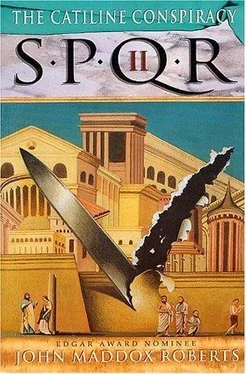John Roberts - The Catiline Conspiracy
Здесь есть возможность читать онлайн «John Roberts - The Catiline Conspiracy» весь текст электронной книги совершенно бесплатно (целиком полную версию без сокращений). В некоторых случаях можно слушать аудио, скачать через торрент в формате fb2 и присутствует краткое содержание. Жанр: Исторический детектив, на английском языке. Описание произведения, (предисловие) а так же отзывы посетителей доступны на портале библиотеки ЛибКат.
- Название:The Catiline Conspiracy
- Автор:
- Жанр:
- Год:неизвестен
- ISBN:нет данных
- Рейтинг книги:3 / 5. Голосов: 1
-
Избранное:Добавить в избранное
- Отзывы:
-
Ваша оценка:
- 60
- 1
- 2
- 3
- 4
- 5
The Catiline Conspiracy: краткое содержание, описание и аннотация
Предлагаем к чтению аннотацию, описание, краткое содержание или предисловие (зависит от того, что написал сам автор книги «The Catiline Conspiracy»). Если вы не нашли необходимую информацию о книге — напишите в комментариях, мы постараемся отыскать её.
The Catiline Conspiracy — читать онлайн бесплатно полную книгу (весь текст) целиком
Ниже представлен текст книги, разбитый по страницам. Система сохранения места последней прочитанной страницы, позволяет с удобством читать онлайн бесплатно книгу «The Catiline Conspiracy», без необходимости каждый раз заново искать на чём Вы остановились. Поставьте закладку, и сможете в любой момент перейти на страницу, на которой закончили чтение.
Интервал:
Закладка:
I was assigned to the army of Metellus Celer. When I was given the assignment, the panic in the city was over. The citizens had redonned the toga, although the red flag still flew atop the Janiculum, in token of the state of war. As I packed to go and join the army, I somehow knew that it would be for a long time. I put my military gear in order and gave my slaves orders to keep my house well, against my return. Then I mounted my horse and rode through the winter drizzle, leading a pack-horse bearing my comforts and personal belongings.
I have never left Rome happily. I always felt a wrench when duty forced me to leave the city, and this time was no exception. There was no one to see me off, and I rode out through the gate as desolate as any stranger leaving Rome.
After a long, cold ride I joined Celer's army near Picenum. Dreams of glory are wonderful, but as quaestor my position in the army was paymaster, scarcely the most heroic of ranks. Even so, I was able to throw myself into the supply and logistics apparatus of the army with some energy. As hastily thrown together as the force was, there was much work to be done.
The fortunes of Catilina had ebbed and flowed according to events in Rome. He had started with a fairly large and enthusiastic force of men, raised first by Manlius and then reinforced by the men who followed Catilina from Rome. They had gathered veterans, deserters, runaway slaves and other malcontents in good numbers for a while. Then, when news of the execution of his supporters in Rome reached them, his followers deserted in great numbers. Thus, one might say that the executions, however illegal, were of benefit to Rome.
What we had facing us at the end was a force of two understrength legions. Just north of the Arno, near Pistoia, we brought him to battle. He had been campaigning in the mountains, retreating toward Gaul. From deserters, Celer had determined Catilina's route of march and had made a sweep around him and placed his legions right across it. With Antonius pushing slowly north with a far larger force, Catilina was being squeezed into a trap.
On the final day, I sat in my saddle next to Celer, uncomfortable in my armor. Before us we could see the rebel force: two understrength legions, a pitiful army with which to conquer the world. They were determined soldiers, though, and we were not going to get through the day without a hard fight. Celer signaled, the trumpets sounded, and the armies rushed together.
The Catilinarians fought with desperate courage, even though their cause was plainly lost. It was a painful thing, to see so many Romans and Italians behaving so heroically, without a chance of victory. There were no mounted troops. Catilina had sent his horse with the others to the rear, in order to fight on foot among his supporters. This was the act of a fine general.
The spears flew, the swords flashed and weapon rattled on shield and armor. It was a long, hard, grinding fight for there were no surrenders from the enemy. Not a single prisoner was taken that day, and none of the defeated sought mercy. It was as if they had all caught the disease of insanity and desperation from Catilina, although I am certain that Celer would have readily granted quarter, had it been asked.
In the end, I saw Catilina's last gesture. We had been taking bad casualties, so hard was the fight. With Celer, I had ridden to a position just behind the center. Over the helmets of several ranks of men, I could see Catilina next to his eagle, waving his sword and urging on his men. As he saw his flanks crumple inward and his forward ranks disintegrate, he came charging through his own ranks, stabbing and slashing. He pushed past his own front rank and plunged into ours, apparently trying to carve a path all the way through our ranks and cut down our commander. It was a Homeric act, and one belonging to the realm of legend, not to the real world.
Just before he went down in a welter of blood, cutting down foes right and left, I thought his eyes locked with mine. I thought I saw a look of reproach in them, before he fell for the last time. It was probably just my disordered mind that saw this. I hope so, at any rate.
There was an uncertain lull for a while, then the men realized that the fight was over. A cheer was raised and the soldiers began a chant, hailing Celer as imperator. He cut this off instantly, berating them for hailing him thus, after a fight in which only fellow-citizens had died. Shamefacedly, the soldiers set about collecting the loot of the battlefield. A centurion came to us and held up two objects. One was Catilina's head. The other was his sword.
I took the sword while Celer directed that the head be sent back to Rome. When that was done Celer turned to me. I was turning the sword over in my hands. It was a fine one, its ivory hilt carved with a serpent wrapped spirally around it. The eyes were tiny rubies.
"It ends as it began," I said.
"What's that you say?" Celer asked.
"Nothing," I said.
"That's an African sword, isn't it?" Celer commented.
"He must have picked it up when he was propraetor there a few years ago."
"He picked up quite a few of them," I muttered.
"Keep it," Celer said. "You ought to have a souvenir out of this miserable business." I kept it. I have it still.
"What now?" I asked after a while.
"Why don't you come with me?" Celer said. "I've spoken with your father. Rome's a bad place for you just now. Pompey will be back in a few months and there's bad blood between you. Crassus has reason to dislike you as well. Be my proquaestor in Gaul. You can use the experience and when you get back those two will have forgotten about you."
I thought about it, but not for long. "I'm with you."
Thus perished Lucius Sergius Catilina, a man who could never acknowledge his own lack of greatness, and who was never more than a tool in the hands of greater men.
These things occurred during the years 691 and 692 of the City of Rome, in the Consulates of Marcus Tullius Cicero and Caius Antonius Hibrida, and that of Decimus Junius Silanus and Lucius Licinius Murena.
GLOSSARY
(Definitions apply to the last century of the Republic.)
Acta: Streets wide enough for one-way wheeled traffic.
Aedile: Elected officials in charge of upkeep of the city and the grain dole, regulation of public morals, management of the markets and the public Games. There were two types: the plebeian aediles, who had no insignia of office, and the curule aediles, who wore the toga praetexta and sat in the sella curulis. The curule aediles could sit in judgment on civil cases involving markets and currency, while the plebeian aediles could only levy fines. Otherwise, their duties were the same. Since the magnificence of the Games one exhibited as aedile often determined election to higher office, it was an important stepping-stone in a political career. The office of aedile did not carry the imperium.
Ancile: (pl. ancilia) A small, oval sacred shield which fell from heaven in the reign of King Numa. Since there was a prophecy that it was tied to the stability of Rome, Numa had eleven exact copies made so nobody would know which one to steal. Their care was entrusted to a college of priests, the Salii (q.v.) and figured in a number of ceremonies each year.
Atrium: Once a word for house, in Republican times it was the entry hall of a house, opening off the street and used as a general reception area.
Atrium Vestae: The Palace of the Vestal and one of the most splendid buildings in Rome. Augur: An official who observed omens for state purposes. He could forbid business and assemblies if he saw unfavorable omens.Basilica: A building where courts met in inclement weather.
Caestus: The Classical boxing glove, made of leather straps and reinforced by bands, plates or spikes of bronze.
Читать дальшеИнтервал:
Закладка:
Похожие книги на «The Catiline Conspiracy»
Представляем Вашему вниманию похожие книги на «The Catiline Conspiracy» списком для выбора. Мы отобрали схожую по названию и смыслу литературу в надежде предоставить читателям больше вариантов отыскать новые, интересные, ещё непрочитанные произведения.
Обсуждение, отзывы о книге «The Catiline Conspiracy» и просто собственные мнения читателей. Оставьте ваши комментарии, напишите, что Вы думаете о произведении, его смысле или главных героях. Укажите что конкретно понравилось, а что нет, и почему Вы так считаете.










